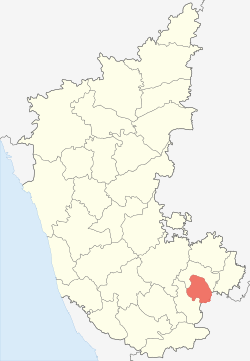eVidyaloka
eVidyaloka is a Bangalore-based NGO that focuses on imparting education to students of Rural government schools in India by crowdsourcing volunteer teachers and connecting them to the rural government schools using the power of IT. [4][5]
 eVidyaloka : To Educate ~ Anywhere Anytime | |
 HQ Location in Bengaluru Urban | |
| Motto | To create a Knowledgeable & Empowered rural India through quality education |
|---|---|
| Formation | 28 January 2011 |
| Founders |
|
| Founded at | Bangalore |
| Type | NGO |
| AAATE4036C (PAN) | |
| Registration no. | DIT(E)BLR/12A/E-153/AAATE4036C/ITO(E)-1/Vol 2012-13[2] |
| Legal status | Trust |
| Headquarters | Bengaluru |
| Coordinates | 12°54′54.446″N 77°37′34.9″E |
Region | India |
| Methods | Computer Based Training |
Key people |
|
Revenue (2017) | ₹15,363,840 (US$220,000)[3] |
| Expenses (2017) | ₹10,238,475 (US$140,000) [3] |
Staff (2019) | 37 |
Volunteers (2019) | 1,100 + (Actively Teaching) |
| Website | www |
| Remarks | To Educate ~ Anywhere Anytime |
About
As of Feb 2020, eVidyaloka is focused on teaching English, Math and Science subjects up to high school grade in Indian states of Andhra Pradesh, Jharkhand, Karnataka, Maharashtra, Tamil Nadu, Telangana, Bihar, Uttar Pradesh, Uttarakhand and West Bengal. Skype, Webex and Google Hangouts are preferred means of communication between teachers and students while Workplace by Facebook is used for internal communication.
[3][6] Skype, Webex and Google Hangouts are preferred means of communication between teachers and students while Workplace by Facebook is used for internal communication.[7][8]
Volunteer Teachers
Volunteer teacher is a passionate individual who connects to the digital classroom in a rural government school and teaches a subject for two hours a week (one hour each on two separate days) using a video conferencing software. The volunteer teachers teach in the regional language spoken in the village where their assigned school is located. Volunteer teachers range from retired persons and housewives to graduate students, PhD scholars and working professionals.
NGO Partners
The digital classrooms are setup in various remote rural locations in India with the support of NGOs that operate in those areas. They monitor the day to day operations of the digital classrooms and provide support to the school/ students as and when required. A person from the locality is recruited and trained in the basic usage of computers. This person is then employed to operate the digital classroom, thus acting as the extended arm of the teacher who appears on the screen. In effect, at least one employment is created with the setting up of each digital classroom, empowering the local community.
References
- Vakkalanka, Harshini (5 December 2017). "Bridging the gap". The Hindu.
- "E-Vidyaloka Trust Income Tax Registration and Exemption" (PDF). Income Tax Department, India. 30 October 2012. Retrieved 19 March 2018.
- "Annual Report 2017" (PDF). www.evidyaloka.org. Retrieved 19 March 2018.
- Shilpa Gerald, Olympia (9 July 2012). "Village children take the Skype route to education". The Hindu.
- CHAKRAVORTY, JOYEETA (16 October 2017). "Classy education, why can't rural kids have it?". Deccan Chronicle.
- Padmanaban, Deepa (26 February 2015). "In rural India, an industrious struggle is improving the poor learning levels in schools". www.scroll.in.
- "Facebook all set to launch 'Facebook at Work' in India". India.com. 19 June 2016.
- Chatterjee, Soumya (13 August 2017). "With digital classrooms, this Bengaluru NGO is battling India's severe tech crunch". The News Minute.
- Khan, Ashwin (22 May 2016). "A Class Apart". Indiatimes.